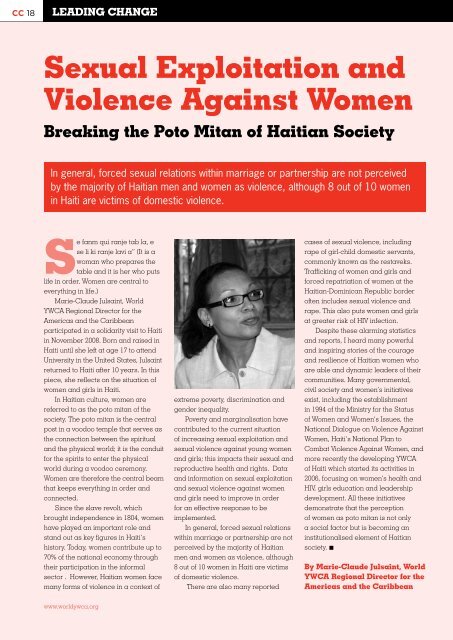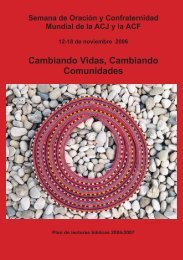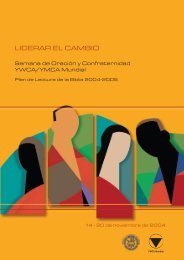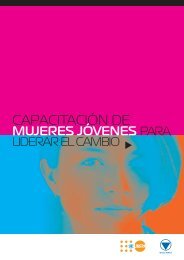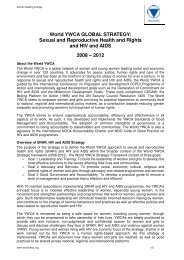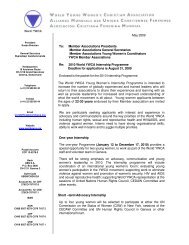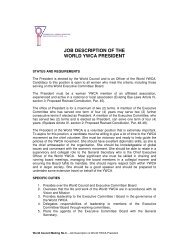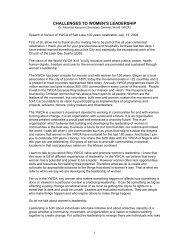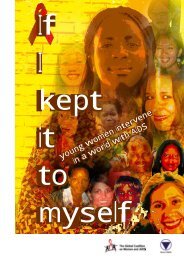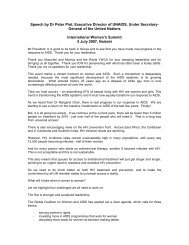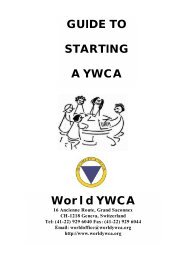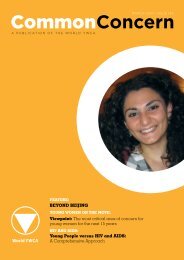World YWCA Let s talk about sex.pdf
World YWCA Let s talk about sex.pdf
World YWCA Let s talk about sex.pdf
Create successful ePaper yourself
Turn your PDF publications into a flip-book with our unique Google optimized e-Paper software.
CC 18<br />
leading Change<br />
Sexual Exploitation and<br />
Violence Against Women<br />
Breaking the Poto Mitan of Haitian Society<br />
In general, forced <strong>sex</strong>ual relations within marriage or partnership are not perceived<br />
by the majority of Haitian men and women as violence, although 8 out of 10 women<br />
in Haiti are victims of domestic violence.<br />
Se fanm qui ranje tab la, e<br />
se li ki ranje lavi a” (It is a<br />
woman who prepares the<br />
table and it is her who puts<br />
life in order. Women are central to<br />
everything in life.)<br />
Marie-Claude Julsaint, <strong>World</strong><br />
<strong>YWCA</strong> Regional Director for the<br />
Americas and the Caribbean<br />
participated in a solidarity visit to Haiti<br />
in November 2008. Born and raised in<br />
Haiti until she left at age 17 to attend<br />
University in the United States, Julsaint<br />
returned to Haiti after 10 years. In this<br />
piece, she reflects on the situation of<br />
women and girls in Haiti.<br />
In Haitian culture, women are<br />
referred to as the poto mitan of the<br />
society. The poto mitan is the central<br />
post in a voodoo temple that serves as<br />
the connection between the spiritual<br />
and the physical world; it is the conduit<br />
for the spirits to enter the physical<br />
world during a voodoo ceremony.<br />
Women are therefore the central beam<br />
that keeps everything in order and<br />
connected.<br />
Since the slave revolt, which<br />
brought independence in 1804, women<br />
have played an important role and<br />
stand out as key figures in Haiti’s<br />
history. Today, women contribute up to<br />
70% of the national economy through<br />
their participation in the informal<br />
sector . However, Haitian women face<br />
many forms of violence in a context of<br />
extreme poverty, discrimination and<br />
gender inequality.<br />
Poverty and marginalisation have<br />
contributed to the current situation<br />
of increasing <strong>sex</strong>ual exploitation and<br />
<strong>sex</strong>ual violence against young women<br />
and girls; this impacts their <strong>sex</strong>ual and<br />
reproductive health and rights. Data<br />
and information on <strong>sex</strong>ual exploitation<br />
and <strong>sex</strong>ual violence against women<br />
and girls need to improve in order<br />
for an effective response to be<br />
implemented.<br />
In general, forced <strong>sex</strong>ual relations<br />
within marriage or partnership are not<br />
perceived by the majority of Haitian<br />
men and women as violence, although<br />
8 out of 10 women in Haiti are victims<br />
of domestic violence.<br />
There are also many reported<br />
cases of <strong>sex</strong>ual violence, including<br />
rape of girl-child domestic servants,<br />
commonly known as the restaveks.<br />
Trafficking of women and girls and<br />
forced repatriation of women at the<br />
Haitian-Dominican Republic border<br />
often includes <strong>sex</strong>ual violence and<br />
rape. This also puts women and girls<br />
at greater risk of HIV infection.<br />
Despite these alarming statistics<br />
and reports, I heard many powerful<br />
and inspiring stories of the courage<br />
and resilience of Haitian women who<br />
are able and dynamic leaders of their<br />
communities. Many governmental,<br />
civil society and women’s initiatives<br />
exist, including the establishment<br />
in 1994 of the Ministry for the Status<br />
of Women and Women’s Issues, the<br />
National Dialogue on Violence Against<br />
Women, Haiti’s National Plan to<br />
Combat Violence Against Women, and<br />
more recently the developing <strong>YWCA</strong><br />
of Haiti which started its activities in<br />
2006, focusing on women’s health and<br />
HIV, girls education and leadership<br />
development. All these initiatives<br />
demonstrate that the perception<br />
of women as poto mitan is not only<br />
a social factor but is becoming an<br />
institutionalised element of Haitian<br />
society. •<br />
By Marie-Claude Julsaint, <strong>World</strong><br />
<strong>YWCA</strong> Regional Director for the<br />
Americas and the Caribbean<br />
www.worldywca.org


